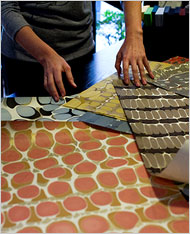“In Spain, Paper Too Beautiful to Use” (New York Times)
Lovely little article about the tradition of fine, handmade papers in Spain, particularly the work of the artisan/artist Montse Buxó i Marsá – since of course paperies, bookbinding, and printing all go hand-in-hand.
The article is fascinating to me for a number of reasons. I love to see anyone who still takes the time and effort to make commonly utilitarian items beautiful (and it’s a shame that the article doesn’t have more photographs). The mass production of items like paper and books means, of course, that access to them has become universalized, but it also means that for the most part, we stop seeing them as individual, potentially artistic items. This is what I was trying to get at, in a highly vague way, in my review of Anna : the distinction between owning “a book” – a singular object – and “a copy of a book.”
In contemporary times, I think we tend to think of a text as an abstract thing that we access through the means of printed words on a page, or through a Word document, or an e-book, or a Kindle. That is, the potential conduits to the actual text are infinite and functionally interchangeable. Compare this with the Middle Ages, when the biggest commissioned “print run” of a major text at one time would be about four, and single, richly decorated volumes would be given as prestigious gifts and left behind as specific bequests in wills; privately owned books were often kept in chests along with the family silver and other valuables.
I love the Printing Revolution and just about everything about it, and I have plenty of tattered, hideous mass market paperbacks that I adore in spite of their mass-market-paperbackiness. In many ways, it’s awesome that books are so widely available that many people don’t think twice about throwing an old copy out, as cringeworthy as some of us may find it. Bottom line, though, I think that beautiful, carefully made books represent a rare unity of tactile, visual, and mental (and occasionally spiritual) pleasure*, and one that’s too rarely considered and appreciated.
*This could be interpreted to explain our “book porn” category, but really, we didn’t think about that one that hard… we’re just easily amused.
